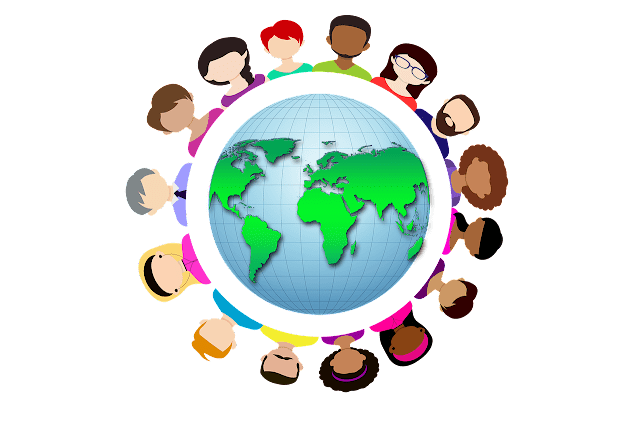Globalization hailed the unity of nations. It paved the way for MNCs (be it Western or Eastern) to expand their businesses globally multiplying their customer base and market exposure. Individuals around the world got access to American products, technologies, services and media, European luxury goods, Japanese and German cars, Japanese technology and so forth. MNC’s like Coca Cola brought the world together spreading happiness; Toyota become known for its lean manufacturing and quality standards that intrigued the West , McDonalds introduced the concept of standardization and glocalization, Gen Z are frenetic for K-Pop and K-drama, Social media giants like Facebook, Twitter and LinkedIn connected individuals, Google made searching for information easier.
Globalization proposed the premises that nations shall focus on their strengths (designing, technology, innovation) whilst outsource and offshore activities and services that cost them cheaper elsewhere. Migration of individuals and skills promoted economic activity, mélange of cultures and diversity, new ideas and innovation. Rampant consumerism boosted sales and economic activity around the world, symbolic of the epitome of a capitalist way of living. US became the hegemonic superpower having an influence on each and every corner of the world by their product and service offerings, media, science and innovation.
However, since the past 2-3 years the world seemed to jostle with multifaceted crisis. The resultant are the words and phrases that are doing rounds in the political and corporate grapevine- self-sufficiency, de- globalization reshoring, the changing world order, hesitancy regarding the dollar as the reserve currency.
In order to revive from the coivd-19 woes, numerous nations adopted quantitative easing as a solution to get the economic engines working during the pandemic. However this monetary stimulus burgeoned inflation in the US that was a rare phenomenon until now. Nevertheless, as the world aimed to recalibrate to the post pandemic world, the Russian invasion of Ukraine played a major blow to the world economy, essentially Pax Americana (the period since America became in charge of the world order (post world war II)
The war presents unsurmountable challenges for the world in terms of supply chain disruption, dearth of essential resource and commodities, scarcity of food (as Russia and Ukraine were the mega exporters), a challenging year for Europe as it prepares for a winter that will not be powered by Russian gas. The decline of Pax Americana itself is a significant debate doing rounds in news reports, news telecast, economic and business reports. Hence virtually trembling the hegemon of America as the world order that existed since the last 2-3 decades.
Individuals from around the world are pouring and proposing their views of plausible solutions or how would the world appear amid this crisis.
A world that flourished in the cradle of globalization is standing divided on the solution to this crisis.
In fact it is not only Coivd 19 or the current geopolitical situation that pose these challenges but an amalgam of events that irked these ramifications over years such as the trade war between the US and China (decoupling), new protectionist immigration policies in the US and Zero-Covid19 policy by China (massive impact on the functioning of the supply chain). Not to forget the incessant quantitative easing practiced by the US since decades.
The resultant a possible wreck to the world economy as different nations are impacted in multifaceted ways. A new form of war between countries ‘the economic war’ as proposed by Zoltan from CreditSussie.
Profound questions are being raised with regards to the changing world order, the US dollar as a reserve currency, decoupling of nations, possible new alliances (friend shoring)
In the US the pandemic sparked inflation due to excessive quantitative easing , government sending paychecks to individuals despite them being employed or not and a disrupted global supply chain. Though paychecks increased demand, supply plateaued for physical goods due supply chain issues at ports or throughout the whole supply chain journey. The solution to this is the tried and tested formula of quantitate tightening by raising interest rates and inducing a slight recession.
However Ray Dalio proposes that the world may encounter a phenomena of a possible stagflation (whether there is economic growth or no, inflation will be inevitable) suggesting that inflation is not going anywhere anytime soon. What worked in the past will not necessarily work in the present as circumstance and situations change.
There are two options to curb this economic turbulence in the US, that essentially is having an impact on the global economy
Soft landing implies reduction in inflation rates, wait for commodity prices to be corrected organically that is seen in the case of copper and more commodities; sufficient level of monetary tightening followed by brief recession of slight negative economic growth v/s an economic growth collapse.
Hard landing works on the premises of surging interest rates beyond limits that would induce negative economic growth. Moreover negative economic growth coupled with new geopolitical surprises or unexpected upsurge in oil prices could lead to inevitable conflict and civil unrest or war – the worst-case scenario.
Hence it is imperative for central banks to focus on and induce soft landing to maintain balance in the world economy and bear small consequences than suffer from paying high price due to unexpected ramifications.
Zoltan highlights interesting facts about the deflationary period and how the US (Pax Americana period) flourished as globalization thrived, benefiting from cheap goods produced in China, access to cheap labour for service industry via immigration thus wage rates remained constant, Europe thrived on access to cheap Russian gas producing goods and lastly the quantitative easing that has been prevalent in the US.
Today inflation comes as a shocker to the US economy as it propels a complete change in the lifestyle for the country. A nation where individuals were not accustomed to high inflation and rising interest rates presents a challenge for the economy and citizens.
Today due to the onset of nativism and new immigration rules America is facing colossal consequences of shortage of labour. At the onset of rising inflation and interest rates individuals either demand higher wages or are not available as they are retiring young. The growth in wages has doubled or increased ten times, as price of necessities are inflating (increasing raw material costs, blow to supply chains- Zero- Coivd-19 policy).
Today they realize that their dependence on different nations for commodities has hit the nation hard. Whilst the US has created a hegemon for its innovation and technological supremacy they lack access to the most basic commodities that bolster their innovations to materialize. Zoltan suggests it is imperative for the US to become self-sufficient amid the scarcity of semiconductor chips (amid China’s blockade of Taiwan and scarce supply of neon gas that is entrapped in the conflict laden Russia and Ukraine), focus on developing and improving their defense capabilities (propelled by this crisis) , reshore essential activities, delve deeper for commodities oil and gas/ fossil fuels elsewhere or at home base.
Whilst the west hailed ESG norms, attaining zero- carbon emissions or becoming carbon neutral since a decade , focusing on generating energy from renewable resources. This lead to seldom investment in building fossil fuel capacities as they relied on Russia and Middle East for gas or oil respectively . USA is itself rich in oil and coal. However due to environmental constraints and rules and regulation they failed to materialize their strengths.
Today it is an eye opener for the world that fossil fuels, coal, oil and gas are still essential and require a revamp in production capacities till supremacy in renewable energy is achieved or hydrogen-based economies become a reality. Some term commodities as a new weapon of warfare as the two nations Russia and China have an abundance of these resources hence higher bargaining power to sell them expensive. However due to political differences and sanctions imposed on both Russia and China (mostly technological), the US and its ally Europe encounter a paucity.
Previously the dollar was the reserve currency as countries bought US treasuries, were required to have a certain percentage of US dollars in their reserves, trade in the dollar was widespread, FX was functioning. However the war seems to have turned the table and is challenging the hegemony of US.
The payment and currency dynamics have taken a 360 degree turn.
Sanctions against Russia were not successful as they are selling their oil and commodities to other developing nations at cheaper prices. Certain nations are already accepting the new currency dynamins and are paying in rubles for Russian oil, whilst Saudi Arabia is accepting renminbi from China to export oil. Countries have become agile to the changing geopolitics, they don’t seek to adopt the ideology of ‘all the eggs in one basket approach’, they are diversifying their reserves portfolio adding other currencies like ruble and renminbi or even commodities like gold and so on.
Brettonwoods III seems to be a talk of the political, economic and corporate town. Zoltan implies the possible transition from a Eurodollar to Eurorenmibi resulting in nations to purchase Chinese treasuries and other imperative commodities like gold and so forth. As the dollar is struggling, commodities are gaining relevance once again. As mentioned by Zoltan the previous approach was ‘our currency, your problem’, with the changing dynamics today it is ‘our commodity, your problem’.
Commodity would once again attain the supremacy it had few decades ago, before being replaced by paper money or fiat currency.
Today we stand at G-Zero where individuals around the world try to corroborate the hegemon of international world order. Individuals believe that the world is failing to work collaboratively to identify solutions to the crisis. Today nations around the world prepare to become self-sufficient to a certain level to reduce dependency on other nations during times of crisis.
New concepts like friend shoring , near shoring (eg. USA and Canada) and reshoring are being broadcasted and discussed as plausible solutions.
The US treasury Secretary shed light on the concept of friend shoring with ally countries. The strategic diversification of the supply chain with nations that are allies and share same values. This in turn would help secure the supply chain, provide access to new markets or maintain access to new markets and lower economic risks (unlike what the world is witnessing today). Eg: US and South Korea for semiconductor chips, US and Canada for rare earth materials.
However this is not going to be easy to implement as it would lead to increasing production costs hence higher prices for consumers. A similar approach was adopted in the midst of the cold war however nations had to choose sides, either Western or Eastern bloc at that time. Today if friend shoring requires nations to take sides it would lead to possible breakage of free and fair trade and increase inequalities in the developing world (east).
But are all nations ready to pick sides?
Seems impossible as the interdependences between all are strong. All nations have different challenges, situations, consequences to face and strategic interests. Time will tell how this will pan out in reality and what will be the terms and conditions nations might have to accept and follow.
The world can either head to constructive resolutions or find themselves in doldrums. However an optimistic approach may wave white flags as nations adopt friend shoring to realign and rearrange supply chains, form new trade alliances and pacts, recoup and recuperate the economic order. Whilst also focus on self- sufficiency than being overly- reliant on other nations- a learning from this crisis. The world may seem divided, however a new wave of globalization can flourish as nations stick to peace, identify solutions to collaborate with allies and get the economic engines working.


